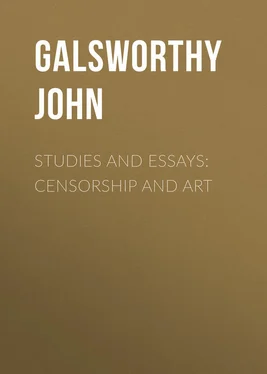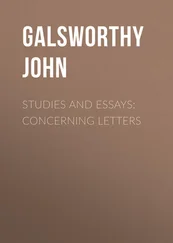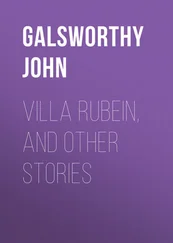John Galsworthy - Studies and Essays - Censorship and Art
Здесь есть возможность читать онлайн «John Galsworthy - Studies and Essays - Censorship and Art» — ознакомительный отрывок электронной книги совершенно бесплатно, а после прочтения отрывка купить полную версию. В некоторых случаях можно слушать аудио, скачать через торрент в формате fb2 и присутствует краткое содержание. Жанр: foreign_antique, foreign_prose, на английском языке. Описание произведения, (предисловие) а так же отзывы посетителей доступны на портале библиотеки ЛибКат.
- Название:Studies and Essays: Censorship and Art
- Автор:
- Жанр:
- Год:неизвестен
- ISBN:нет данных
- Рейтинг книги:3 / 5. Голосов: 1
-
Избранное:Добавить в избранное
- Отзывы:
-
Ваша оценка:
- 60
- 1
- 2
- 3
- 4
- 5
Studies and Essays: Censorship and Art: краткое содержание, описание и аннотация
Предлагаем к чтению аннотацию, описание, краткое содержание или предисловие (зависит от того, что написал сам автор книги «Studies and Essays: Censorship and Art»). Если вы не нашли необходимую информацию о книге — напишите в комментариях, мы постараемся отыскать её.
Studies and Essays: Censorship and Art — читать онлайн ознакомительный отрывок
Ниже представлен текст книги, разбитый по страницам. Система сохранения места последней прочитанной страницы, позволяет с удобством читать онлайн бесплатно книгу «Studies and Essays: Censorship and Art», без необходимости каждый раз заново искать на чём Вы остановились. Поставьте закладку, и сможете в любой момент перейти на страницу, на которой закончили чтение.
Интервал:
Закладка:
Having observed that there is no reason whatever for the exemption of Literature, let us now turn to the case of Art. Every picture hung in a gallery, every statue placed on a pedestal, is exposed to the public stare of a mixed company. Why, then, have we no Censorship to protect us from the possibility of encountering works that bring blushes to the cheek of the young person? The reason cannot be that the proprietors of Galleries are more worthy of trust than the managers of Theatres; this would be to make an odious distinction which those very Managers who uphold the Censorship of Plays would be the first to resent. It is true that Societies of artists and the proprietors of Galleries are subject to the prosecution of the Law if they offend against the ordinary standards of public decency; but precisely the same liability attaches to theatrical managers and proprietors of Theatres, in whose case it has been found necessary and beneficial to add the Censorship. And in this connection let it once more be noted how much more easily the ordinary standards of public decency can be assessed by a single person responsible to no one, than by the clumsy (if more open) process of public protest. What, then, in the light of the proved justice and efficiency of the Censorship of Drama, is the reason for the absence of the Censorship of Art? The more closely the matter is regarded, the more plain it is, that there is none! At any moment we may have to look upon some painting, or contemplate some statue, as tragic, heart-rending, and dubiously delicate in theme as that censured play "The Cenci," by one Shelley; as dangerous to prejudice, and suggestive of new thought as the censured "Ghosts," by one Ibsen. Let us protest against this peril suspended over our heads, and demand the immediate appointment of a single person not selected for any pretentiously artistic feelings, but endowed with summary powers of prohibiting the exhibition, in public galleries or places, of such works as he shall deem, in his uncontrolled discretion, unsuited to average intelligence or sensibility. Let us demand it in the interest, not only of the young person, but of those whole sections of the community which cannot be expected to take an interest in Art, and to whom the purpose, speculations, and achievements of great artists, working not only for to-day but for to-morrow, must naturally be dark riddles. Let us even require that this official should be empowered to order the destruction of the works which he has deemed unsuited to average intelligence and sensibility, lest their creators should, by private sale, make a profit out of them, such as, in the nature of the case, Dramatic Authors are debarred from making out of plays which, having been censured, cannot be played for money. Let us ask this with confidence; for it is not compatible with common justice that there should be any favouring of Painter over Playwright. They are both artists – let them both be measured by the same last!
But let us now consider the case of Science. It will not, indeed cannot, be contended that the investigations of scientific men, whether committed to writing or to speech, are always suited to the taste and capacities of our general public. There was, for example, the well-known doctrine of Evolution, the teachings of Charles Darwin and Alfred Russet Wallace, who gathered up certain facts, hitherto but vaguely known, into presentments, irreverent and startling, which, at the time, profoundly disturbed every normal mind. Not only did religion, as then accepted, suffer in this cataclysm, but our taste and feeling were inexpressibly shocked by the discovery, so emphasised by Thomas Henry Huxley, of Man's descent from Apes. It was felt, and is felt by many to this day, that the advancement of that theory grossly and dangerously violated every canon of decency. What pain, then, might have been averted, what far-reaching consequences and incalculable subversion of primitive faiths checked, if some judicious Censor of scientific thought had existed in those days to demand, in accordance with his private estimate of the will and temper of the majority, the suppression of the doctrine of Evolution.
Конец ознакомительного фрагмента.
Текст предоставлен ООО «ЛитРес».
Прочитайте эту книгу целиком, купив полную легальную версию на ЛитРес.
Безопасно оплатить книгу можно банковской картой Visa, MasterCard, Maestro, со счета мобильного телефона, с платежного терминала, в салоне МТС или Связной, через PayPal, WebMoney, Яндекс.Деньги, QIWI Кошелек, бонусными картами или другим удобным Вам способом.
Интервал:
Закладка:
Похожие книги на «Studies and Essays: Censorship and Art»
Представляем Вашему вниманию похожие книги на «Studies and Essays: Censorship and Art» списком для выбора. Мы отобрали схожую по названию и смыслу литературу в надежде предоставить читателям больше вариантов отыскать новые, интересные, ещё непрочитанные произведения.
Обсуждение, отзывы о книге «Studies and Essays: Censorship and Art» и просто собственные мнения читателей. Оставьте ваши комментарии, напишите, что Вы думаете о произведении, его смысле или главных героях. Укажите что конкретно понравилось, а что нет, и почему Вы так считаете.












